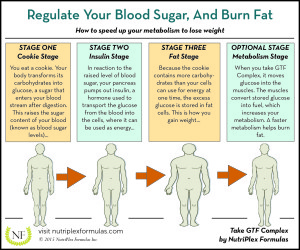Anyone who has tried to lose weight can tell you the process is so much more complex than counting calories in and calories out.
The formula for daily caloric intake has been a subject of controversy, disproven by various experts and even frustrated dieters, posing questions such as these:
- Why can some people stay thin eating anything they’d like, while other people seem to gain weight if they so much as look at a cookie?
- How could my weight be impacted the same way if I eat a thousand calories worth of broccoli versus a thousand calories worth of doughnuts?
- If I only burn off 200 calories at the gym, can I just cut 200 calories from my diet, skip the workout, and lose the same amount of weight?
- Why do some prescription drugs make me gain weight when my diet hasn’t changed?
Obviously, there are more elements involved than just calories when it comes to weight loss, and here’s the explanation: Every body is different.
We are all impacted by factors such as hormonal balance, rate of activity, diet, environmental toxins, sleep quality, states of health, stress, genetics, and so forth.
One of the main points those who are trying to lose weight should take into consideration is their blood sugar levels.
Here’s why:
When you eat something, your body takes the carbohydrates (or sugars) from the food and turns them into blood sugar (also known as “glucose”). The glucose is picked up by insulin, a hormone the pancreas produces for the express purpose of transporting glucose to the cells. If the cells need energy, the glucose is transformed into energy and used; if they already have enough energy, the glucose is stored away as fat (to burn when the body needs more energy). Some glucose is also stored in the liver and in the muscles.
The higher the levels of glucose in the blood, the more insulin needs to be created to transport it all to the cells. So, if you’re eating a large amount of carbohydrates at once, your pancreas starts working in overdrive to handle the load – a working capacity that cannot be sustained for long (disease inevitably results when the pancreas wears out and can no longer produce enough insulin).
But when more insulin is produced, more sugar is being moved through and out of the bloodstream, which often leads to a sudden drop in both insulin and blood sugar levels – meaning, we end up both physically and mentally exhausted, and craving more carbohydrates (because our bodies are looking to refuel on energy). A common symptom of low blood sugar is that blackout feeling you get when you go from sitting or squatting to standing.
Because the cells can only use so much energy at one time, a majority of the blood sugar ends up stored as fat. This is an important fact: your body converts sugar to fat. This is the cause of weight gain. Eating fats does not make people fat, but eating carbohydrates on a regular basis does.
Every time blood sugar levels spike, your hormonal system, energy levels, and digestive system are thrown off balance, prompting a vicious cycle that ends in fat storage.
The lesson here is that eliminating the blood sugar spikes will put your system back in balance and set the stage for natural weight loss.
From this perspective, there are a few actions you can take to regulate your blood sugar levels:
1. Take NutriPlex Formulas GTF Complex. “GTF” is an acronym that stands for Glucose Tolerance Factor. GTF Complex, a molecular complex containing the mineral chromium, works by taking the glucose out of the bloodstream and depositing it into the muscles, where it’s used as fuel. This process increases the metabolism, which, in turn, burns more fat.
2. Cut down on high carbohydrate foods. Especially anything containing sugar or sugar substitutes. It becomes obvious, when you learn about blood sugar, that if carbohydrates are converted into glucose and then stored as fat, eating fewer carbohydrates means you won’t have to store as many of them as fat. And not all carbohydrates are the same: The more refined they are, the more havoc they play on your system.
3. Increase your fiber intake. Fiber slows the pace of glucose absorption into the bloodstream, which means insulin won’t be pumped out as quickly to address it, and there will be more of an opportunity for your body to process and use the glucose for energy before it can be ushered away into fat storage.
4. Exercise. Exercise lowers blood sugar. According to Amanda Gardner’s Health Magazine article, “How Exercise Lowers Blood Sugar in Type 2 Diabetes,” “When you exercise, your muscles become more sensitive to insulin and absorb more glucose from the blood.” When your muscles are absorbing more of the glucose from the blood stream, it means both that blood sugar levels are lowering and that less glucose is being stored as fat.
So, when attempting to lose weight, it makes more sense to examine how fat is created and stored than to rely on a simplified “calories in, calories out” approach.
Keeping your blood sugar levels related will prove to be a big and vital step in the right direction. Getting blood sugar metabolism under control is important for everyone. Even thin people can suffer from blood sugar imbalances. But if you are overweight, the first place to begin is by regulating your blood sugar through proper diet and supplementation.
http://www.health.com/health/condition-article/0,,20188779,00.html

